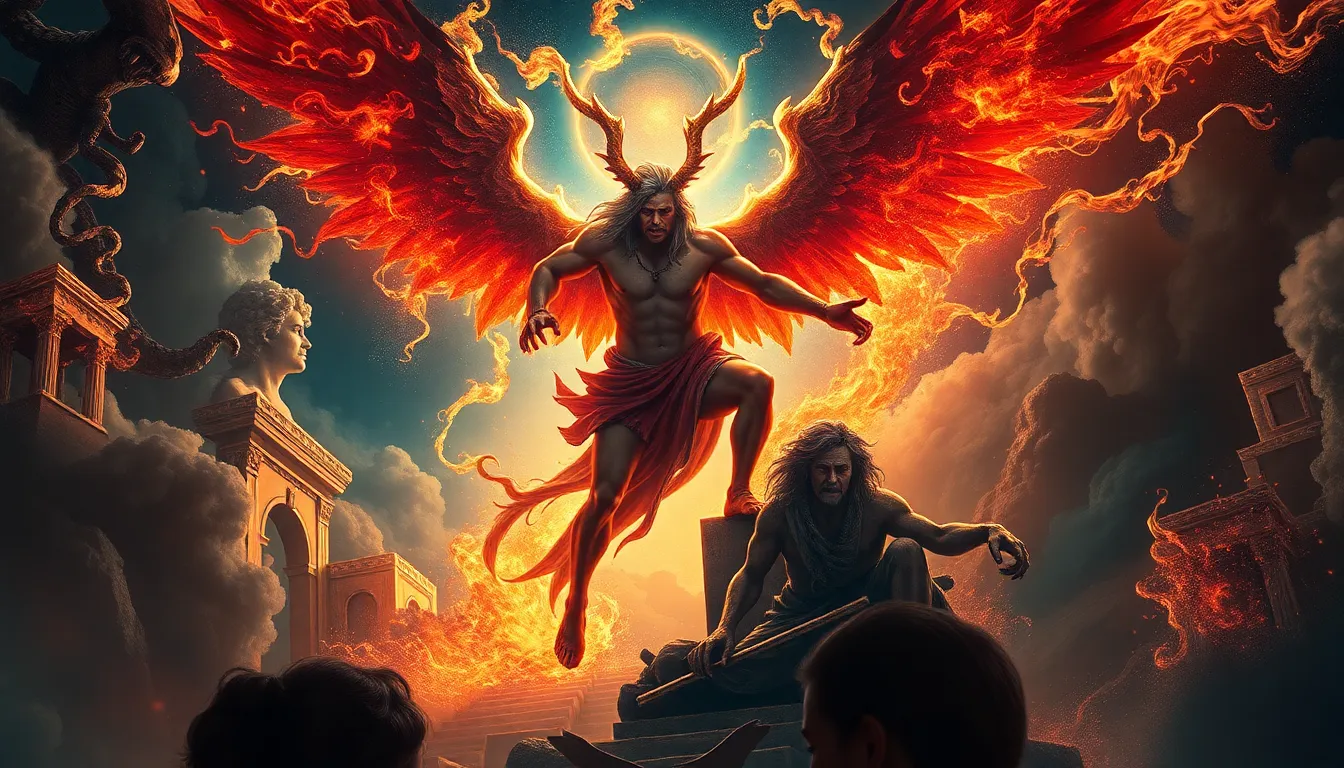The Legacy of Divine Retribution in Modern Literature and Media
I. Introduction
Divine retribution is a concept deeply rooted in human culture, representing the idea that individuals receive punishment or reward from a higher power for their actions. This notion is not only prevalent in religious texts but also permeates the fabric of literature and media throughout history. The importance of divine retribution in storytelling lies in its capacity to explore themes of justice, morality, and human behavior, offering audiences a framework through which to understand the complexities of right and wrong. This article will delve into the historical context, themes in modern literature, representations in film and television, psychological impacts, critiques, and future directions of divine retribution as seen in contemporary narratives.
II. Historical Context of Divine Retribution
The roots of divine retribution can be traced back to ancient civilizations, where gods were believed to intervene in human affairs to ensure moral order. In various religious texts, acts of divine punishment serve as cautionary tales, warning believers of the consequences of immoral behavior. For example:
- The Biblical concept of “an eye for an eye” illustrates the belief that justice must be balanced and proportionate.
- In Greek mythology, the Furies were deities of vengeance who pursued wrongdoers, ensuring that justice was served.
Over the centuries, the concept of divine retribution has evolved, influenced by shifts in cultural, philosophical, and religious paradigms. Literature has been a powerful medium for expressing these changes, with key works such as:
- Dante Alighieri’s “Divine Comedy,” which reflects the Christian view of afterlife justice.
- Shakespeare’s tragedies, where flawed characters face dire consequences for their actions.
III. Themes of Divine Retribution in Modern Literature
Modern literature continues to explore the theme of divine retribution, often questioning traditional notions of justice and morality. Some key areas of exploration include:
- Exploration of justice and morality: Many contemporary authors challenge the binary of good and evil, presenting complex characters who navigate moral ambiguity.
- Character arcs and their consequences: Characters often undergo significant transformations, facing the repercussions of their choices in ways that evoke sympathy and understanding.
Notable works that exemplify these themes include:
- “The Road” by Cormac McCarthy: This novel presents a post-apocalyptic world where the remnants of humanity grapple with morality and survival, hinting at a cosmic justice that remains elusive.
- “The Handmaid’s Tale” by Margaret Atwood: In this dystopian narrative, the consequences of societal oppression highlight the struggle for agency and the quest for justice in an unjust world.
IV. The Role of Divine Retribution in Film and Television
The theme of divine retribution is prevalent in film and television, often serving as a narrative device that propels character development and plot progression. Popular movies and shows that depict this theme include:
- “Se7en”: This psychological thriller explores the concept of sin and punishment through the lens of a serial killer who embodies the seven deadly sins.
- “The Punisher”: This character-driven narrative showcases vigilante justice and the moral complexities of vengeance.
Television shows also incorporate divine retribution, such as:
- “Lost”: The series features characters facing personal reckonings that reflect broader themes of fate and redemption.
- “Breaking Bad”: The transformation of Walter White into a drug kingpin illustrates the consequences of one man’s choices, culminating in a narrative steeped in moral retribution.
Visual storytelling techniques, such as symbolism and foreshadowing, enhance the portrayal of divine retribution, creating a rich tapestry of meaning that resonates with audiences.
V. The Psychological Impact of Divine Retribution
The theme of divine retribution evokes a range of psychological responses from audiences. Key aspects include:
- Audience perceptions of justice and morality: Viewers often grapple with their own beliefs about fairness, leading to a deeper engagement with narratives that challenge their moral frameworks.
- Emotional responses to narratives of retribution: Stories that depict retribution can elicit strong emotional reactions, from satisfaction to discomfort, as audiences reflect on the nature of justice.
- The role of catharsis in storytelling: The resolution of moral conflicts can provide audiences with a sense of closure, allowing for emotional release and reflection.
VI. Critiques and Counter-Narratives
Despite its prevalence, the concept of divine retribution faces philosophical objections, particularly regarding its implications for free will and moral responsibility. Key points include:
- Philosophical objections: Some argue that the idea of a higher power administering justice undermines the agency of individuals and the complexity of moral decision-making.
- Alternative interpretations: Modern narratives often present counter-narratives that challenge the clear-cut nature of retribution, recognizing the shades of gray in human behavior.
- The rise of antiheroes: Characters who embody moral ambiguity—such as Tony Soprano in “The Sopranos” or Walter White in “Breaking Bad”—reflect a shift in storytelling that complicates traditional notions of justice.
VII. Future Directions: Divine Retribution in Emerging Media
As media continues to evolve, the theme of divine retribution will likely adapt and transform. Potential future directions include:
- Video games and interactive storytelling: The rise of immersive narratives allows players to engage with moral choices directly, creating unique experiences of retribution.
- The impact of social media: Platforms for storytelling are increasingly participatory, leading to narratives that reflect collective morality and justice.
- Predictions for evolution: Future works may increasingly blur the lines between hero and villain, emphasizing a more nuanced understanding of justice in a globalized world.
VIII. Conclusion
The legacy of divine retribution is a powerful thread woven throughout the tapestry of literature and media. Its significance lies not only in its historical roots but also in its continuing relevance in contemporary narratives. As society grapples with complex moral dilemmas, the exploration of divine retribution will remain a vital aspect of storytelling, prompting reflection on justice, morality, and the human condition. In a world where questions of right and wrong persist, the narratives of retribution challenge us to consider the implications of our actions and the moral frameworks that guide us.




